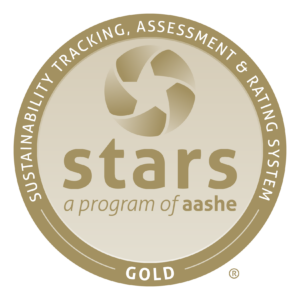“Pre-consumer” composting closes loop at SOU dining operations
(Ashland, Ore.) — The Hawk dining commons at Southern Oregon University is now addressing the issue of potential food waste at both ends of the food service stream, after beginning a new program this month to collect and compost scraps generated in the preparation of student meals. The composted “pre-consumer” waste is used to enrich soil at The Farm at SOU – and grow more produce for the dining commons.
The dining facility – operated by Aladdin Campus Dining and used primarily by students in SOU residence halls – tackled the issue of post-consumer waste three years ago by using a small grant from the Oregon Department of Environmental Quality to replace 10.5-inch plates with nine-inch plates. The larger plates tended to encourage diners to take more food than they could consume in one sitting.
“This composting program is just another step in our efforts to create a more sustainable dining operation on campus,” said Daniel Kelly, marketing and sustainability coordinator for Aladdin’s SOU operations. “Switching to a smaller plate size a few years ago was an effort to generate less post-consumer waste. This is just another avenue for us to tackle the same issue of reducing waste … but this time it’s in the area of pre-consumer waste.”
The new program will result in the composting of about 400 pounds of food preparation waste each week – materials such as egg shells and scraps from fruits, vegetables and bread. The two-step collection process begins with compostable waste being deposited in specially marked green bins adjacent to the Hawk’s kitchen prep tables; that waste is moved to larger, secondary containers when the smaller bins fill, and the larger containers are transported by truck on Mondays, Wednesdays and Fridays to The Farm, a few blocks to the northeast.
Aladdin plans to expand the composting program to all other dining locations on campus – Elmo’s and Einstein Bros. Bagels in the Stevenson Union, Southern Grounds at the Hannon Library and the Landing at Raider Village.
Kelly acknowledged the unanswered question: why not compost post-consumer food scraps? That’s a bit more complicated, he said, because scraps from diners’ food plates are often mixed with materials such as meat that typically can’t be composed due to health and safety concerns. But potential solutions that may allow some form of post-consumer composting will continue to be explored.
In the meantime, all partners in the new pre-consumer composting operation – SOU Dining, The Farm at SOU, and Facilities Management and Planning – are pleased that the “closed loop” program will support the university’s sustainability goals while improving productivity.
“As we get more and more produce from The Farm in our dining operations, being able to take some waste back to The Farm to turn it into compost creates a circular aspect, as that compost later gets used to support the crops at The Farm to generate more produce,” Kelly said. “It’s a win for plants, the environment and all the people who interact with food on campus – students, staff and community members.”
-SOU-




 “It is an honor for SOU to be recognized for its contributions to heal and preserve our environment,” SOU President Rick Bailey said. “Achieving the ‘Gold’ level is a huge accomplishment that reflects our commitment to sustainability.
“It is an honor for SOU to be recognized for its contributions to heal and preserve our environment,” SOU President Rick Bailey said. “Achieving the ‘Gold’ level is a huge accomplishment that reflects our commitment to sustainability.





